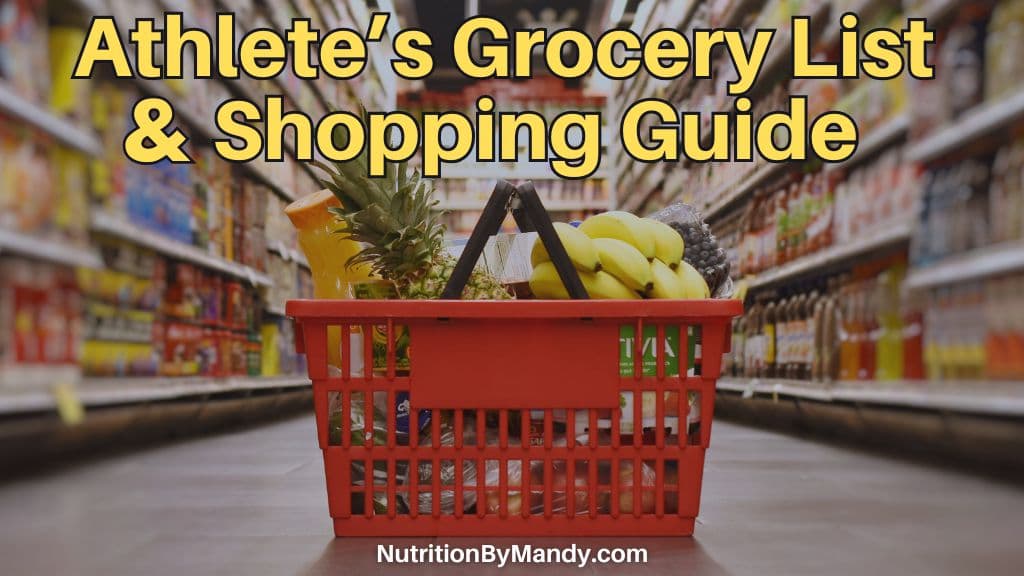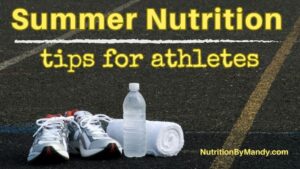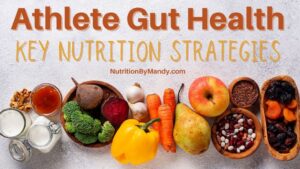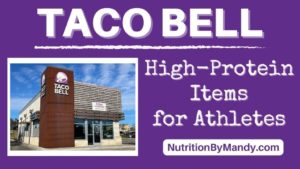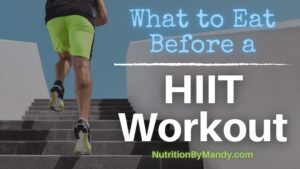Last Updated on October 30, 2024 by Mandy Tyler, M.Ed., RD, CSSD, LD
Athlete’s Grocery List and Shopping Guide
It can be helpful for athletes to know what items to shop for at the grocery store to help meet their sports nutrition needs.
Let’s examine the steps that athletes should take prior to grocery shopping. Then we will explore each section of the grocery store to identify key items for athletes to include on their grocery lists.
Preparing to Shop
Prior to going to the store, there are several important steps that athletes can take to prepare for the trip.
First, athletes should consider their plans for the upcoming week. Questions to consider include:
- Do they have any morning practices scheduled that they will need to plan breakfast-on-the-go for?
- Do they need to pack a lunch during the week or will they have time to eat lunch at home?
- What healthy snacks do they need to plan for between meals?
- Do they have any evening practice or games when a quick dinner will be needed?
- Is there any travel scheduled that will reduce the number of meals eaten at home?
With their weekly schedule in mind, I encourage athletes to take a brief inventory of their kitchen. They should identify what items they are running low on and note any specific items they will need for recipes in the upcoming week.
Create an Athlete’s Grocery List
Next, athletes should take time to create a grocery list. Making a grocery list before shopping can help ensure that athletes get all the items needed in one trip. This can help athletes save valuable time during the week.
I find that having a grocery list can also help athletes with limiting impulse purchases at the store.

Understand the Store Layout
As athletes make their grocery list, it can be helpful to organize the list according to the layout of the store.
In general, the outer perimeter of the store tends to be fresh food items, such as:
- Fresh fruits and vegetables
- Dairy and eggs
- Meat, poultry, and seafood
- Deli counter
- Bakery
On the interior aisles of the store, you typically find canned food items, breakfast cereals, bread, rice, pasta, baking mixes, nut butters, as well as the frozen food section.
Athletes may have previously been told to “shop the perimeter” of the store and avoid the interior aisles with processed foods.
As a sports dietitian, this is not a message I share with athletes. Of course, I want athletes to shop the perimeter of the store and load-up on fresh produce, lean protein, and dairy food.
However, the interior aisles of the store have a lot of nutritious options as well. Athletes just need to be selective in their choices. Whole grain bread, oatmeal, pasta, rice, and canned beans are all great choices that can be included on an athlete’s grocery list.

Creating an Athlete’s Grocery List
Now that you are familiar with key steps to take before grocery shopping. Let’s take a look at each section of the store to identity items that athletes can include on their grocery lists.
Athlete’s Grocery List: Fresh Fruits and Vegetables
First on the list is the fresh produce section of the store. When selecting fresh produce, I encourage athletes to shop for produce that is currently in-season.
When produce is in-season it will have more flavor and be less expensive than produce that is out of season. The United States Department of Agriculture has a Seasonal Produce Guide that is a helpful reference for determining fruits and vegetables that are grown each season.
Some of my top seasonal vegetable and fruit choices for athletes include:
- Fall: Apples, grapes, raspberries, broccoli, cauliflower, bell peppers, pumpkin, sweet potatoes
- Winter: Brussel sprouts, pomegranates, grapefruit, oranges, beets, winter squash
- Spring: Avocados, strawberries, kiwi, apricots, asparagus, kale, spinach
- Summer: Watermelon, cherries, blueberries, blackberries, tomatoes, cucumbers, summer squash
Pro Tip: If athletes are looking to save money at the store, they should purchase whole, fresh fruits and vegetables and chop the produce themselves.
Athlete’s Grocery List: Dairy and Eggs
Next on the list is the dairy and egg section of the store. When purchasing dairy products, it is important for athletes to remember to check the item’s expiration date.
Athletes should only purchase the quantity they can reasonably consume prior to the product expiring.
Some of my favorite dairy food products for athletes include:
- High-protein milk
- Chocolate milk
- Greek yogurt
- Cottage cheese
- Cheese sticks and string cheese
Eggs: Protein-Rich Addition to an Athlete’s Grocery List
Eggs are a nutritious addition to an athlete’s grocery list and an easy way for athletes to add protein to their meals and snacks.
One large egg contains 6 grams of protein. The majority of the protein in the egg comes from the egg white (~4 grams), however, the yolk is rich in vitamins and minerals (1, 2, 3).
Eggs also contain choline, important for cognitive function, as well as selenium, riboflavin, Vitamin K, and antioxidants (1).
Once purchased, eggs must be stored in the refrigerator at a temperature of 40°F or below. The Food and Drug Administration recommends that eggs be stored in their original carton and used within 3 weeks for highest quality (4).
In addition to the use of eggs at breakfast to make omelets and scrambled eggs, hard-boiled eggs can be a great addition to meals and snacks. If athletes prepare hard-boiled eggs at home, they should be eaten within 1 week of cooking to reduce the risk of foodborne illness (4).

Athlete’s Grocery List: Meat & Seafood
I encourage athletes to make sure their grocery lists contain a variety of sources of protein, including chicken, turkey, seafood, and lean cuts of beef and pork.
When purchasing beef or pork, leaner cuts of meat typically have “loin” or “round” in the name (i.e., top sirloin, pork loin, or bottom round roast). For ground beef or ground turkey, athletes should consider purchasing varieties that are 93% lean or leaner.
Fatty fish, including salmon, tuna, herring, and mackerel, are all good sources of healthy omega-3 fatty acids and a nutritious addition to an athlete’s sports nutrition meal plan.
Pro Tip: To help save money at the store, athletes can purchase bulk packages of beef, chicken, and pork and freeze what they will not eat during the week. Buying large packages of meat is less expensive per pound and an easy way to save money.
Deli Meat Counter
When considering lean sources of protein, athletes should not forget about deli meat and cheese. If possible, I encourage athletes to select deli meat that is cut fresh for them at the store.
When selecting deli meat choose healthier varieties, such as turkey, chicken, roast beef, and ham. Italian deli meats such as salami, pepperoni, and bologna tend to be higher in saturated fat and less healthy choices.
Hummus: Plant-Based Addition to an Athlete’s Grocery List
Hummus can often be found near the deli counter and is a great addition to an athlete’s grocery list. It is made with chickpeas, which provide carbohydrates, fiber, protein, vitamins, and minerals.
Hummus is a nutritious dip option for fresh veggies, pretzels, or pita chips. It can also be a tasty addition to your favorite sandwich or wrap.

Shopping the Interior Aisles: Athlete’s Grocery List Ideas
Let’s now explore the interior aisles of the store, including whole grains, canned and packaged foods, and the frozen food section.
Athlete’s Grocery List: Whole Grains
When shopping the interior aisles of the stores, athletes should make sure to grab a variety of whole grain items. Whole grains contain fiber, vitamins, and minerals, making them a healthy part of an athlete’s sports nutrition meal plan.
When selecting whole grain items, read the package to ensure the product is 100% whole grain. As you read the ingredient list, the word “whole” should be listed as the first ingredient in the product, such as whole wheat, whole rye, or whole oat.
Whole grain items that I encourage athletes to add to their grocery lists include:
- Whole grain bread, bagels, English muffins, wraps, tortillas, crackers
- Oatmeal, whole grain breakfast cereal
- Granola bars, breakfast bars, fig bars
- Pasta: Whole wheat, lentil, or chickpea varieties
- Brown rice, quinoa
- Protein pancake and muffin mixes
If athletes are looking for a quick side dish to enjoy with their meals, they can purchase brown rice and quinoa in microwavable pouches.
Storing Whole Grain Bread, Bagels, Tortillas, and Wraps
If athletes are not sure they will eat the whole grain bread items before going stale, consider storing the bread products in the freezer.
According to the USDA, commercially baked bread can be stored in the freezer for 3 months. This may be a good option for athletes who frequently travel, as you can defrost the item to enjoy as needed.
Pro Tip: I like to keep whole wheat tortillas on hand in the freezer. This allows me to have tortillas on hand to prepare breakfast tacos in the morning or a quick quesadilla for dinner on a busy weeknight.
Athlete’s Grocery List: Canned and Packaged Food
There are a variety of canned and packaged food items that I encourage athletes to include on their grocery list. Many of these items have a long shelf-life, thus they are great items for athletes to have available in their pantries.
Some of my favorite canned and packaged food items include:
- Applesauce – Easy high-carb snack for before practice
- Canned fruit – Packed in natural juices
- Dried fruit
- Beans
- Chili with beans
- Broth-based soups
- Pasta sauce
- Salsa
- Beef or turkey jerky
- Trail mix – Made with nuts and dried fruit
Tuna and Salmon
Canned or packaged tuna and salmon is a nutritious addition to an athlete’s grocery list providing both lean protein and healthy omega-3 fatty acids. It is a great way for an athlete to add seafood to their weekly meal plan at a lower cost than fresh seafood.
I recommend that athletes choose tuna or salmon that is packed in water rather than oil for a healthier choice.
Many brands of tuna and salmon now come in convenient single-serving pouches, making them ideal for lunch on-the-go or an afternoon snack.
Athlete’s Grocery List: Nuts and Nut Butters
Nuts and nut butters are a nutritious addition to an athlete’s grocery list providing protein, healthy unsaturated fats, vitamins, and minerals (5, 6).
I encourage athletes to select a variety of types of nuts to enjoy in their meal plan, as different types of nuts provide different nutritional benefits.
Some of my top choices for nuts include:
- Walnuts
- Almonds
- Pistachios
- Cashews
- Hazelnuts
- Pecans
- Peanuts
- Pine nuts
Nut butters make a great topping for sandwiches, spread for crackers, or dip for apple slices, celery, or pretzels. In general, a 2-tablespoon serving of nut butter contains ~7 grams of protein (6, 7).
When selecting a nut butter, athletes should choose a product that has limited added ingredients. Some nut butters contain added sugars and hydrogenated oils, making them less healthy choices.
If athletes have a nut allergy, they can consider trying SunButter® products, which are made with sunflower seeds and are nut allergen free.
Athlete’s Grocery List: Frozen Foods
There are a variety of items in the frozen food section that athletes can stock up on. Having healthy frozen food on hand can come to the rescue for a quick breakfast on-the-go or easy dinner on busy weeknights.
Frozen Fruits and Vegetables
Frozen fruits and vegetables are one of my top recommendations for an athlete’s grocery list.
When fruits and vegetables are frozen, they are flash-frozen at the peak of their ripeness. Therefore, frozen fruits and vegetables retain a similar nutrient content to that of fresh produce.
Athletes should consider keeping a variety of frozen berries, tropical fruit, and sliced bananas on hand to make a healthy fruit smoothie. Frozen fruit can also be a great topping for Greek yogurt or an ingredient in overnight oats.
When it comes to frozen vegetables, select those that are packaged without added sauces or seasonings. This will allow athletes versatility when preparing recipes on how they use the frozen vegetables.
In addition, athletes can purchase frozen vegetables that can be steamed directly in the bag, which make for a convenient addition to meals.

Frozen Food Items for an Athlete’s Grocery List
In addition to frozen produce, there are a variety of other frozen food items I encourage athletes to keep on hand.
Some of my top frozen food recommendations for athletes include:
- Protein toaster waffles or pancakes
- Turkey or chicken breakfast sausage
- Chicken breasts
- Frozen fish (salmon, tuna, cod, mahi mahi)
- Turkey meatballs
- Grilled steak or chicken fajita meat
Pro Tip: Athletes should take cooler bags when shopping to pack frozen food into. This will help ensure the food stays cold until they get home.
Athlete’s Grocery List and Shopping Guide
You are now ready to create your athlete’s grocery list and go shopping. Athletes should remember to take time prior to shopping to review their schedule for the week and make a list of all of their grocery needs.
For additional sports nutrition tips, make sure to check out my blog on meal prep for athletes.
Join the Nutrition By Mandy Email List & Get a Free Athlete’s Grocery List
Click HERE to join the Nutrition By Mandy e-mail list. When you join you will receive a free athlete’s grocery list to print and take with you to the store.
About the Author
Mandy Tyler is a Sports Dietitian Nutritionist in the San Antonio, TX area. She is a Registered and Licensed Dietitian, a Board-Certified Specialist in Sports Dietetics, a Licensed Athletic Trainer, and is a Certified Exercise Physiologist through the American College of Sports Medicine. Mandy has experience working with athletes at the high school, collegiate, and professional levels. She believes the key to reaching one’s full potential, both in everyday life and in sports performance, relies on a healthy nutritional foundation.

If you are looking to take your performance to the next level, make sure to check out my new Sports Nutrition Game Day Guide. This downloadable guide is written to help athletes develop an individualized plan to achieve peak performance on game day.

